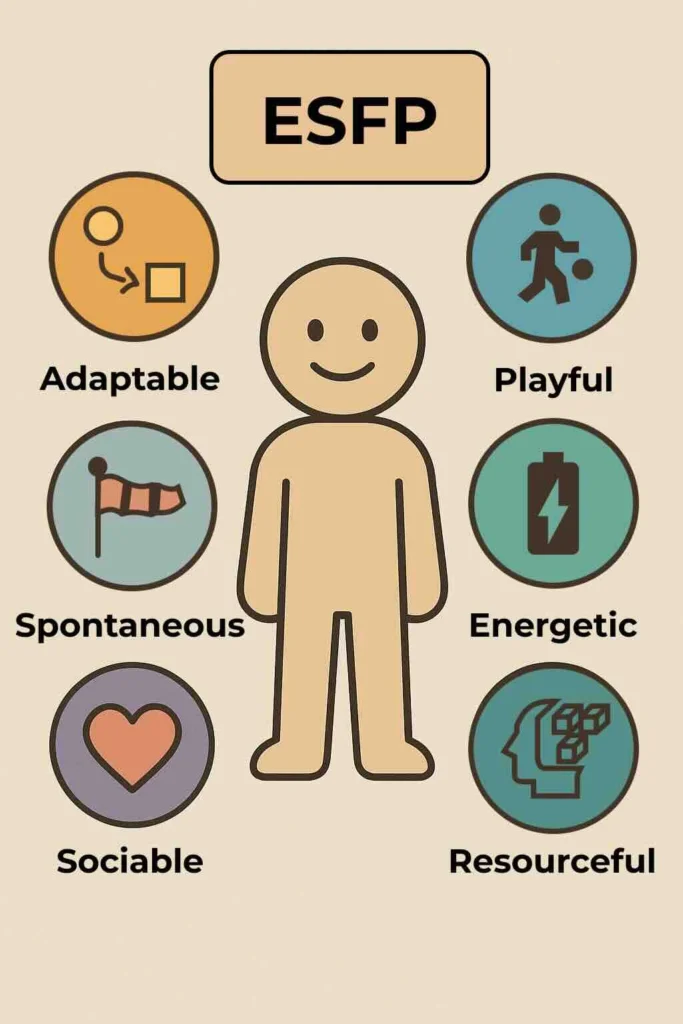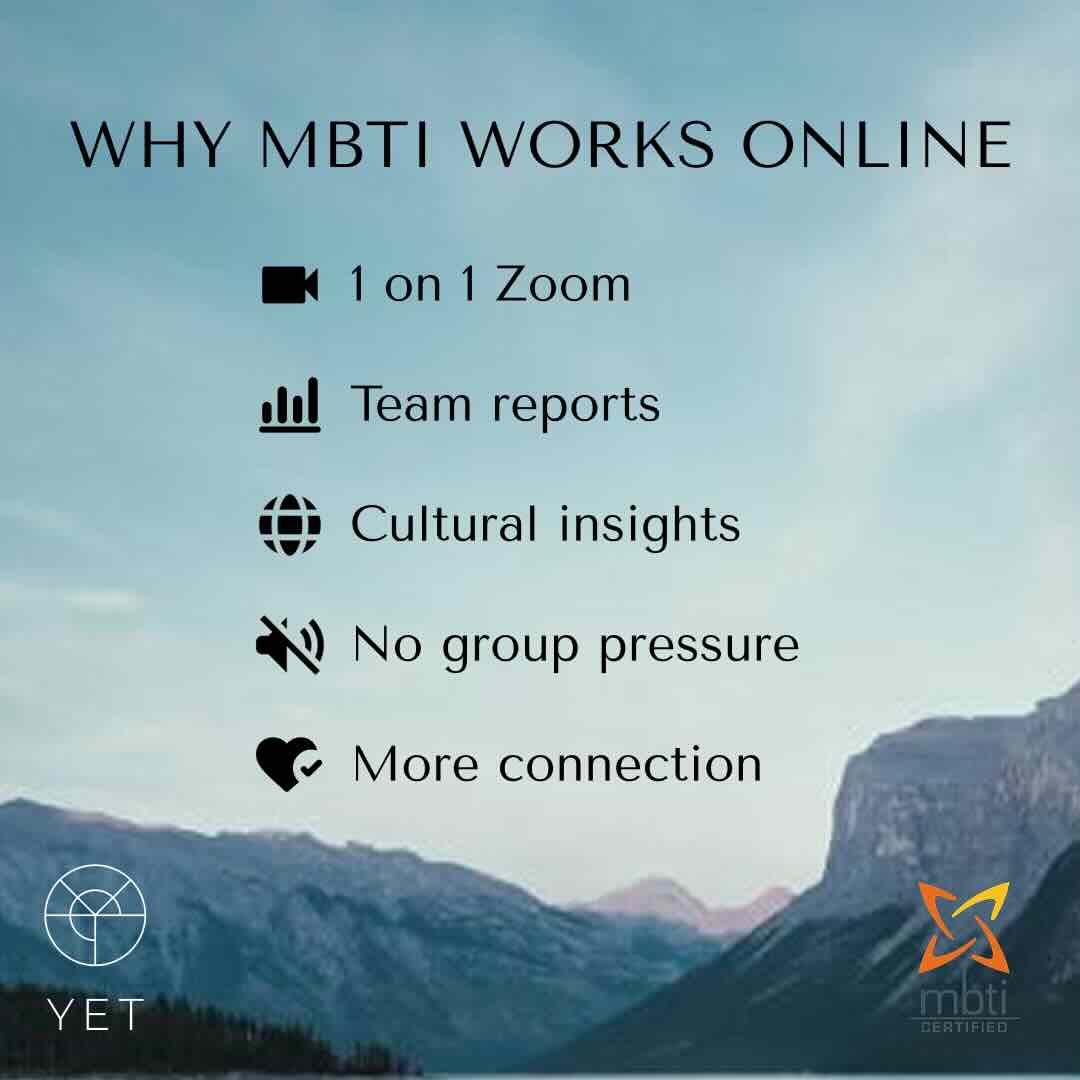ESFP: The Enthusiastic Improviser
In the MBTI® framework, ESFPs are often referred to as “The Enthusiastic Improviser” for their vibrant, spontaneous, and people-centered approach to life. Known for their charm and love of living in the moment, ESFPs bring energy and joy to those around them. Defined by their Extraverted, Sensing, Feeling, and Perceiving preferences, ESFPs are natural entertainers who thrive on new experiences and connections.
This blog explores the core traits, strengths, challenges, and workplace dynamics of ESFPs, offering a deeper understanding of this lively personality type.
Core Traits of ESFPs
1. Extraverted (E):
ESFPs draw energy from social interactions and enjoy being the center of attention. They thrive in dynamic environments where they can connect with others.
2. Sensing (S):
Grounded in the present, ESFPs focus on practical realities and enjoy sensory experiences. They have a knack for appreciating life’s simple pleasures.
3. Feeling (F):
ESFPs prioritize harmony and value emotional connections. Their decisions are often guided by empathy and consideration for others’ feelings.
4. Perceiving (P):
Flexible and adaptable, ESFPs prefer to keep their options open. They excel at improvising and navigating unexpected changes.
Strengths of the ESFP Personality Type
1. Charismatic and Sociable:
ESFPs are natural entertainers who can light up any room with their energy and humor.
2. Adaptable and Spontaneous:
They excel in fast-paced situations and are quick to think on their feet.
3. Empathetic and Caring:
ESFPs are deeply attuned to others’ emotions, making them supportive friends and confidants.
4. Practical and Hands-On:
They enjoy working on tangible tasks and have a strong sense of what works in real-world situations.
5. Optimistic and Fun-Loving:
ESFPs bring a positive outlook to challenges, inspiring others with their enthusiasm and zest for life.
Challenges and Growth Areas for ESFPs
1. Avoidance of Routine:
ESFPs may struggle with long-term planning and tasks that feel monotonous.
Growth Tip: Incorporate small, enjoyable rewards to stay motivated during routine work.
2. Impulsiveness:
Their love for spontaneity can sometimes lead to hasty decisions.
Growth Tip: Pause to evaluate options and consider long-term consequences before acting.
3. Sensitivity to Criticism:
ESFPs may take feedback personally and feel hurt by negative comments.
Growth Tip: Focus on the constructive aspects of feedback and view it as an opportunity for growth.
4. Overcommitment:
Their eagerness to please can result in taking on too much at once.
Growth Tip: Practice setting boundaries and saying no when necessary.
5. Difficulty with Abstract Concepts:
ESFPs prefer practical solutions and may find theoretical discussions unengaging.
Growth Tip: Link abstract ideas to real-world examples to make them more relatable.
ESFPs in the Workplace
ESFPs thrive in roles that allow them to interact with others, express their creativity, and stay active. They excel in environments that are collaborative, energetic, and flexible.
Ideal career paths for ESFPs include:
– Event Planning: Coordinating lively and memorable experiences.
– Sales and Marketing: Building relationships and promoting products with enthusiasm.
– Entertainment and Performance: Using their charisma to captivate audiences.
– Healthcare and Social Work: Providing compassionate care and support.
– Entrepreneurship: Bringing fresh ideas and energy to innovative ventures.
In team settings, ESFPs are valued for their positivity, practical insights, and ability to boost morale.
ESFPs in Personal Relationships
ESFPs are warm, affectionate, and deeply loyal partners. They prioritize shared experiences and enjoy creating joyful memories with their loved ones. While they may avoid deep or serious conversations at times, they are deeply caring and committed when their relationships need attention.
Conclusion: Celebrating the ESFP Personality
ESFPs bring energy, charm, and a deep appreciation for life’s joys to every situation. By embracing their strengths and addressing their growth areas, ESFPs can continue to spread positivity and make a meaningful impact on those around them.
Read more about the ESFP in a cultural context here.
Read more about the ESFP on our Instagram account here:
FAQs About the ESFP Personality Type
1.How do ESFPs handle stress?
Under stress, ESFPs may seek distractions or become overly focused on immediate problems. They thrive when they take time to recharge through social activities, physical exercise, or engaging in hobbies that bring them joy.
2. What are ESFPs like in a relationship?
ESFPs are affectionate, fun-loving, and spontaneous partners. They prioritize shared experiences and enjoy creating special moments with their loved ones. While they may sometimes avoid serious discussions, their loyalty and care shine through when it matters most.
3.How many ESFPs are there in the world?
ESFPs make up approximately 8-10% of the population, making them one of the more common personality types. Their vibrant energy ensures they are often noticed in any group.
4. Are there more women or men who are ESFPs?
Statistically, there are slightly more women who identify as ESFPs than men, though the type is well-represented across all genders. Their charm and enthusiasm transcend traditional gender roles, making them beloved in a variety of contexts.





